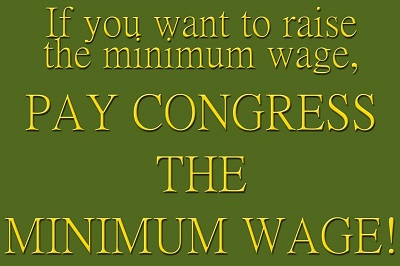Why Cutting Congressional Pay Will Not Solve Any Problems

Facebook seems to be constantly inundated with memes that have similar themes to this one:
There are several variations of this meme, from stating that Congress should make what our soldiers make to not paying Congress if they can't do their job.
But all of these memes have a common error in their logic: the assumption that members of Congress "need" their paychecks or that the paycheck is what truly motivates them.
What Does Congress Actually Make?
There's a lot of social media confusion about what the congressional pay package really is, a lot of it coming from memes that claim that they get pensions for life after serving only one term (which is, in fact, untrue).In general, most members of Congress make $174,000 per year, with the Speaker of the House and chamber leaders making $223,500 and $193,400, respectively.
Receiving pensions is based on time of service, which can become quite complicated. However, a complete rundown of the rules can be found here.
In fairness, this is still an enormous wage, placing the average congressional pay in the top quintile (which started at $104, 096 in 2012). Leaders in Congress are in the top 5 percent of all wages paid.
However, has the pay gotten out of line in the context of American history?
One of the first duties of the first Congress was to set congressional wages. Before that, the individual states were responsible for paying their respective representatives.
After some wrangling, the pay was set at $6 per day of Congress being in session. Congress met about 165 days on average, making the pay about $990 per year.
In context, a private in the army maderoughly $48 per year during this period. Effectively, congressional members were making about 20 times the pay of a private.
Currently, privates in the Army make about $18,000 per year, which means that the current Congress makes about 10 times the pay.
This isn't to say that Congress gets paid an appropriate wage; it just highlights the fact that they have always been paid high wages.
But the real question is, do they really need this salary?
Some Statistics on the Net Worth of the 114th Congress
Almost 51 percent of the members of Congress are millionaires, compared to roughly 6 percent of the general population.
While themost common net worth in Congress is in the $1 million range, there are some impressive outliers. Seven have a net worth of more than $100 million, while about two dozen have a negative net worth.
The wealthiest member is U.S. Rep. Darrell Issa (R-Calif.), with a net worth of $448.4 million, followed by U.S. Sen. Mark Warner (D-Va.), with $254.1 million. Coming in at last place is U.S. Rep. David Valadao (R-Calif.), who boasts a net worth of negative $11.5 million.
The point of all of this is that over half of Congress could work for free if they wanted to, without having any substantial ill effects. To assume that they have the everyday problems about worrying where their next mortgage payment is coming from is to underestimate the true net worth of Congress, coming in at over $4 billion collectively.
Members of Congress Spend More Campaigning than the Job Actually Pays
Looking for a moment at one of 2014's competitive races gives insight into this reality. The Kansas U.S. Senate race between incumbent Republican U.S. Sen. Pat Roberts and independent candidate Greg Orman highlights the sheer amount of money poured into the election process.Not including the more than $15 million spent by PAC sources, Pat Roberts' campaign spent $8,113,419, while Greg Orman's campaign spent $5,639,365. A U.S. Senate salary pays a total of $1,044,000 over a six-year term in office. This means the campaigns spent roughly 8 and 5 times this salary, respectively, just to get elected.
While almost all of this money comes from outside sources, it is an indication of just how easy it is to "buy" a candidate's allegiance through campaign financial support. Any shot of re-election depends on staying true to the ideology of the contributors. The vast amount of funding needed more or less means that a candidate's views are unlikely to change.
Sure the Money is Nice -- But P-O-W-E-R is the Name of the Game
And this is the flaw of all of the memes we see on Facebook: money is not the motivating factor, it's power. Holding on to this power means being able to be re-elected, which means being beholden to campaign financiers.
Referring to the deficit crisis, Warren Buffett has probably the best answer to curing any problem that our nation faces:
I could end the deficit in five minutes. You just pass a law that says that any time there's a deficit of more than three percent of GDP, all sitting members of Congress are ineligible for re-election. Yeah, yeah, now you've got the incentives in the right place, right? -- Warren Buffett, interview with Becky Quick on CNBC
Buffett has a point, but wholesale term limit laws would not be much benefit; it puts too much power in the hands of the non-elected congressional staffers who would be constantly guiding freshman members of Congress through the system.
Greg Orman had the right idea on how to reform Washington. His four-part plan for reforming Congress had all of the key elements needed to actually change a system of cronyism and power.
Key to this plan is creating a lifetime ban on all members of Congress from becoming lobbyists. The struggle for power continues after their terms, with almost half of Congress becoming well-paid lobbyists after they learn the political game on the taxpayer's dime.
If we ever want to fix Washington and the issues that really matter in America, we need to limit the power our leaders can consolidate. Compromise is rarely achieved by those who are only interested in accumulating and consolidating more and more power.






